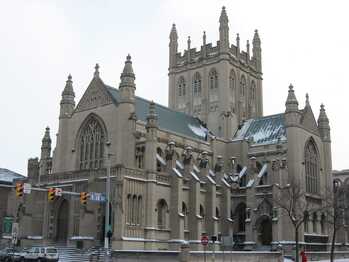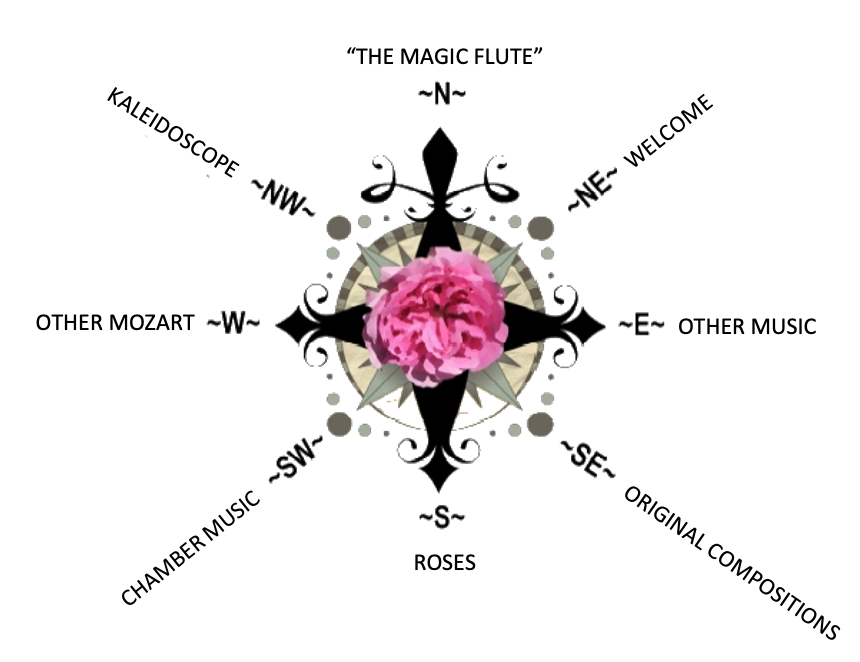- Home
- N - The Magic Flute
- NE - Welcome!
-
E - Other Music
- E - Music Genres >
- E - Composers >
-
E - Extended Discussions
>
- Allegri: Miserere
- Bach: Cantata 4
- Bach: Cantata 8
- Bach: Chaconne in D minor
- Bach: Concerto for Violin and Oboe
- Bach: Motet 6
- Bach: Passion According to St. John
- Bach: Prelude and Fugue in B-minor
- Bartok: String Quartets
- Brahms: A German Requiem
- David: The Desert
- Durufle: Requiem
- Faure: Cantique de Jean Racine
- Faure: Requiem
- Handel: Christmas Portion of Messiah
- Haydn: Farewell Symphony
- Liszt: Évocation à la Chapelle Sistine"
- Poulenc: Gloria
- Poulenc: Quatre Motets
- Villa-Lobos: Bachianas Brazilieras
- Weill
-
E - Grace Woods
>
- Grace Woods: 4-29-24
- Grace Woods: 2-19-24
- Grace Woods: 1-29-24
- Grace Woods: 1-8-24
- Grace Woods: 12-3-23
- Grace Woods: 11-20-23
- Grace Woods: 10-30-23
- Grace Woods: 10-9-23
- Grace Woods: 9-11-23
- Grace Woods: 8-28-23
- Grace Woods: 7-31-23
- Grace Woods: 6-5-23
- Grace Woods: 5-8-23
- Grace Woods: 4-17-23
- Grace Woods: 3-27-23
- Grace Woods: 1-16-23
- Grace Woods: 12-12-22
- Grace Woods: 11-21-2022
- Grace Woods: 10-31-2022
- Grace Woods: 10-2022
- Grace Woods: 8-29-22
- Grace Woods: 8-8-22
- Grace Woods: 9-6 & 9-9-21
- Grace Woods: 5-2022
- Grace Woods: 12-21
- Grace Woods: 6-2021
- Grace Woods: 5-2021
- E - Trinity Cathedral >
- SE - Original Compositions
- S - Roses
-
SW - Chamber Music
- 12/93 The Shostakovich Trio
- 10/93 London Baroque
- 3/93 Australian Chamber Orchestra
- 2/93 Arcadian Academy
- 1/93 Ilya Itin
- 10/92 The Cleveland Octet
- 4/92 Shura Cherkassky
- 3/92 The Castle Trio
- 2/92 Paris Winds
- 11/91 Trio Fontenay
- 2/91 Baird & DeSilva
- 4/90 The American Chamber Players
- 2/90 I Solisti Italiana
- 1/90 The Berlin Octet
- 3/89 Schotten-Collier Duo
- 1/89 The Colorado Quartet
- 10/88 Talich String Quartet
- 9/88 Oberlin Baroque Ensemble
- 5/88 The Images Trio
- 4/88 Gustav Leonhardt
- 2/88 Benedetto Lupo
- 9/87 The Mozartean Players
- 11/86 Philomel
- 4/86 The Berlin Piano Trio
- 2/86 Ivan Moravec
- 4/85 Zuzana Ruzickova
-
W - Other Mozart
- Mozart: 1777-1785
- Mozart: 235th Commemoration
- Mozart: Ave Verum Corpus
- Mozart: Church Sonatas
- Mozart: Clarinet Concerto
- Mozart: Don Giovanni
- Mozart: Exsultate, jubilate
- Mozart: Magnificat from Vesperae de Dominica
- Mozart: Mass in C, K.317 "Coronation"
- Mozart: Masonic Funeral Music,
- Mozart: Requiem
- Mozart: Requiem and Freemasonry
- Mozart: Sampling of Solo and Chamber Works from Youth to Full Maturity
- Mozart: Sinfonia Concertante in E-flat
- Mozart: String Quartet No. 19 in C major
- Mozart: Two Works of Mozart: Mass in C and Sinfonia Concertante
- NW - Kaleidoscope
- Contact
Trinity "Hodie" Service
Trinity "Hodie" Service
Evensong at Trinity Cathedral, Cleveland, Ohio
December 10, 2021
Kira McGirr, mezzo-soprano
(Magnificat- 14:40 | Nunc Dimittis- 19:30 | Amen- 23:00)
Evensong at Trinity Cathedral, Cleveland, Ohio
December 10, 2021
Kira McGirr, mezzo-soprano
(Magnificat- 14:40 | Nunc Dimittis- 19:30 | Amen- 23:00)
Featured for a limited time on the website
Amplify Female Composers
Advent Calendar Project 2020, week three
Trinity "Hodie" Service
Trinity Cathedral } Kira McGirr, mezzo-soprano
Trinity Cathedral } Kira McGirr, mezzo-soprano
Choral Evensong
Evensong hangs on the wall of English life like an old, familiar cloak passed through the generations. Rich with prayer and scripture, it is nevertheless totally nonthreatening. It is a service into which all can stumble without censure––a rambling old house where everyone can find some corner to sit and think, to listen with half-attention, trailing a few absentminded fingers of faith or doubt in its passing stream. Most religious celebrations gather us around a table of some sort. They hand us a book or a plate, or speak a word of demanding response. They want to ‘touch’ us. Choral Evensong is a liturgical expression of Christ’s Nolle me tangere –– ‘Do not touch me. I have not yet ascended to my Father’ (St. John 20:17). It reminds us that thresholds can be powerful places of contemplation; and that leaving someone alone with their thoughts is not always denying them hospitality or welcome. Stephen Hough
Trinity "Hodie" Service (©2016) by Judith Eckelmeyer
Trinity Cathedral, Cleveland, OH
December 14, 2016
Note: Score available upon request. Please use this link to contact me with your request.
“Hodie” is the Latin word for “today”. It begins the lovely plainchant “Hodie Christus natus est, hodie Salvator aparuit”—“Today Christ is born, today the Savior appears”. I chose these phrases to introduce the canticle of Simeon, “Nunc dimittis”—“Lord, now let thy servant depart in peace”. This canticle and Mary’s song “Magnificat anima mea”—“My soul magnifies the Lord”—are integral parts of the Evensong service. In Evensong, the “Magnificat” precedes “Nunc dimittis”; the two form bookends to the narrative of Jesus’s birth.
The Gospel of Luke tells of Mary’s visit to her cousin, Elizabeth. Mary is pregnant with Jesus, and responds to Elizabeth’s praise of her with a series of ecstatic exclamations conveying her various emotions as she ponders the ways in which God has worked in her life and the history of her people. I imagined Mary’s world: she is unique, alone in her circumstance, thus I have written for a solo female singer without any instrumental accompaniment. Each line of Mary’s canticle is rich with its own meaning yet grows toward the remarkable conclusion that God “remembering his mercy has helped his people Israel, as he promised to our forefathers Abraham and his seed forever”.
Jesus is born. The plainchant affirms this as a kind of newscast, setting up Simeon’s appearance in Evensong. Simeon is a “devout and righteous man” in Jerusalem; the Holy Spirit has assured him that he will not die before seeing the salvation of Israel—the messiah. Forty days after Jesus’s birth, Mary and Joseph honor the obligation to present the child at the Temple. Simeon is moved to go to the Temple on that same day. There, he meets the family and actually gets to hold the baby. Simeon responds at first with the low energy of an old and dying man, but then he becomes transported by the thought of this baby as the fulfillment of God’s promise that he will be “a light to the nations and the glory of Israel”.
The Gospel of Luke tells of Mary’s visit to her cousin, Elizabeth. Mary is pregnant with Jesus, and responds to Elizabeth’s praise of her with a series of ecstatic exclamations conveying her various emotions as she ponders the ways in which God has worked in her life and the history of her people. I imagined Mary’s world: she is unique, alone in her circumstance, thus I have written for a solo female singer without any instrumental accompaniment. Each line of Mary’s canticle is rich with its own meaning yet grows toward the remarkable conclusion that God “remembering his mercy has helped his people Israel, as he promised to our forefathers Abraham and his seed forever”.
Jesus is born. The plainchant affirms this as a kind of newscast, setting up Simeon’s appearance in Evensong. Simeon is a “devout and righteous man” in Jerusalem; the Holy Spirit has assured him that he will not die before seeing the salvation of Israel—the messiah. Forty days after Jesus’s birth, Mary and Joseph honor the obligation to present the child at the Temple. Simeon is moved to go to the Temple on that same day. There, he meets the family and actually gets to hold the baby. Simeon responds at first with the low energy of an old and dying man, but then he becomes transported by the thought of this baby as the fulfillment of God’s promise that he will be “a light to the nations and the glory of Israel”.
Magnificat and Nunc dimittis
Magnificat
Luke 1:45-55
My soul doth magnify the Lord, and my spirit hath rejoiced in God my Savior. For he hath regarded the lowliness of his handmaiden. For behold from henceforth all generations shall call me blessed. For he that is mighty hath magnified me, and holy is his Name. And his mercy is on them that fear him throughout all generations. He hath showed strength with his arm; he hath scattered the proud in the imagination of their hearts. He hath put down the mighty from their seat, and hath exalted the humble and meek. He hath filled the hungry with good things, and the rich he hath sent empty away. He remembering his mercy hath holpen his servant Israel, as he promised to our forefathers, Abraham and his seed for ever.
Glory be to the Father, and to the Son, and to the Holy Ghost; as is was in the beginning, is now and ever shall be, world without end, Amen.
Luke 1:45-55
My soul doth magnify the Lord, and my spirit hath rejoiced in God my Savior. For he hath regarded the lowliness of his handmaiden. For behold from henceforth all generations shall call me blessed. For he that is mighty hath magnified me, and holy is his Name. And his mercy is on them that fear him throughout all generations. He hath showed strength with his arm; he hath scattered the proud in the imagination of their hearts. He hath put down the mighty from their seat, and hath exalted the humble and meek. He hath filled the hungry with good things, and the rich he hath sent empty away. He remembering his mercy hath holpen his servant Israel, as he promised to our forefathers, Abraham and his seed for ever.
Glory be to the Father, and to the Son, and to the Holy Ghost; as is was in the beginning, is now and ever shall be, world without end, Amen.
Nunc dimittis
Luke 2:29-32 (1662 Book of Common Prayer)
Lord, now lettest thou thy servant depart in peace, according to thy word. For mine eyes have seen thy salvation, which thou hast prepared before the face of all people. To be a light to lighten the Gentiles, and to be the glory of thy people Israel.
Glory be to the Father, and to the Son, and to the Holy Ghost; as is was in the beginning, is now and ever shall be, world without end, Amen.
Luke 2:29-32 (1662 Book of Common Prayer)
Lord, now lettest thou thy servant depart in peace, according to thy word. For mine eyes have seen thy salvation, which thou hast prepared before the face of all people. To be a light to lighten the Gentiles, and to be the glory of thy people Israel.
Glory be to the Father, and to the Son, and to the Holy Ghost; as is was in the beginning, is now and ever shall be, world without end, Amen.
Choose Your Direction
The Magic Flute, II,28.



